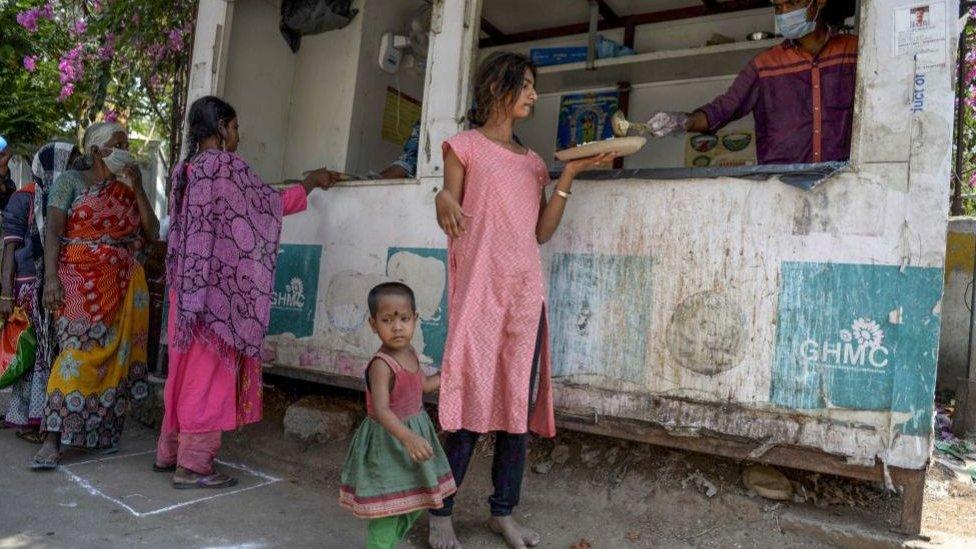Coronavirus: 'Act early to save more than 30 million lives'
- Published
- comments

Many countries like India face a huge challenge during the virus epidemic
More than 30 million lives around the world could be saved during the coronavirus pandemic if countries act quickly, a report from Imperial College London researchers suggests.
The ideal strategy is to introduce widespread testing and strict social distancing measures rapidly.
Acting early could reduce mortality by as much as 95%, the report finds.
But lower-income countries are likely to face a much higher burden than wealthier nations.
Researchers from Imperial College in London, external looked at the health impact of the pandemic in 202 countries using a number of different scenarios, and based their estimates on data from China and high-income countries.
Doing nothing to combat the virus would leave the world facing around 40 million deaths this year, the report says.
Social distancing - to reduce the social contacts in the general population by 40% and among the elderly and vulnerable population by 60% - could bring this down by about half.
But health systems in all countries would still be quickly overwhelmed, the report adds
If countries adopt stricter measures early - such as testing, isolating cases and wider social distancing to prevent transmission to more people - 38.7 million lives could be saved.
This is equivalent to a 95% reduction in mortality.
If these measures are introduced later, the figure could drop to 30.7 million, the researchers estimate.
"Delays in implementing strategies to suppress transmission will lead to worse outcomes and fewer lives saved," they conclude.
'Grave global threat'
The effects of the pandemic are likely to be most severe in developing countries,
There will be 25 times more patients needing critical care than beds available, compared to seven times more in high-income countries, the report says.
The researchers say their models are not predictions of what will happen. Instead they illustrate the magnitude of the problem and the benefits of acting quickly.
They say strategies to suppress the virus will need to be maintained in some way until vaccines or effective treatments become available to avoid the risk of another epidemic.
Prof Neil Ferguson, from Imperial College London and author of the report, said: "Our research adds to the growing evidence that the COVID-19 pandemic poses a grave global public health threat.
"Countries need to act collectively to rapidly respond to this fast-growing epidemic.
"Sharing both resources and best practice is critically important if the potentially catastrophic impacts of the pandemic are to be prevented at a global level."

Analysis by David Shukman, science editor
Behind the careful phrasing and cold language of this study is a nightmare vision of what the pandemic could mean globally, especially to the poorest people on the planet.
With bigger households, including the older generations most at risk, and healthcare systems that are far more fragile than those in richer countries, the prospects for developing nations look grim.
Speaking to the scientists while they were preparing the report, it was clear that they were all too aware of the horrific implications of their work.
Originally, the study was meant to be released last week but as each day passed new data emerged which could be added to the model - the computer simulation of the outbreak - to make it more accurate.
It all leads to a stark conclusion: that as the virus spreads, only the most draconian measures will lessen the impact and that the countries least able to protect themselves will be among the hardest hit.

EASY STEPS: How to keep safe
A SIMPLE GUIDE: What are the symptoms?
GETTING READY: How prepared is the UK?
MAPS AND CHARTS: Visual guide to the outbreak
TRAVEL PLANS: What are your rights?
PUBLIC TRANSPORT: What's the risk?
